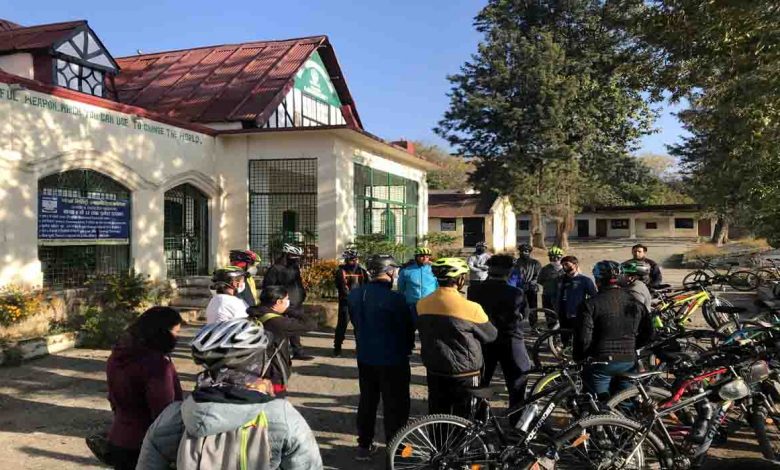Cycle or Perish!

Monday, 28 June 2021 | Lokesh Ohri | in Guest Column
Hillbilly
 Lokesh Ohri
Lokesh Ohri
GUEST COLUMN
During the recent lockdowns, combined as they were with the arrival of the pre-monsoon showers, residents of Dehradun were treated to views of clear, azure blue skies. Social media was agog with pictures and text messages of skies where you could almost not believe, as one message said, “that you were in India!” People in neighbouring towns, Roorkee and Saharanpur, a little further down into the plains, were treated with views of the snow-clad Himalayas, something they had not seen in living memory.
If the destructive virus has given out one message, loud and clear, it is this that we need to rethink our lifestyles, especially the manner in which we commute from one place to another. It is quite clear that our predilection for fossil-fuel based motorised transport has now become a health hazard. That our lungs are not quite healthy enough was quite evident from how relatively easily young people from amongst us succumbed to the virus induced infections.
Pollution is a lifestyle choice we have made consciously even at the cost of our lives, especially in Dehradun. One look at our Google weather app on our smartphones is enough to tell us that quite often, our air is not healthy. Being situated in a cup-shaped valley does not help our cause either, since the pollution we spew into the air stays there – air currents cannot take it away – for that much longer, until our substantial rains pour it back on us as acid rain. The choice is ours, cars or health!
Across the world, major cities like London and New York are making ambitious plans to convert their motorised urban areas into cycling cities. A new urgency has set in after a major Cambridge study, tracking more than 3,00,000 commuters has revealed that cycling to work can cut the risk of dying early from illnesses such as heart disease and cancer by up to 24 per cent. Richard Patterson from the MRC Epidemiology Unit at the University of Cambridge, who led the research, hailed post-lockdown plans of several cities to dramatically increase numbers of cycle lanes and walking routes into city centres.He said the study demonstrates clearly that a large increase in active cycle commutes would have significant positive health impacts.
The conclusive report, published in The Lancet Planetary Health journal by researchers at Imperial College, London and the University of Cambridge, used Census data to track a cohort of commuters in England and Wales between 1991 and 2016. It found that those who cycled to work saw an overall 20 per cent reduced rate of early death during the period, compared with car drivers.They saw a 24 per cent reduced rate of death from cardiovascular disease – which includes heart attack and stroke – a 16 per cent reduced rate of death from cancer, and an 11 per cent reduced rate of a cancer diagnosis. And the health benefits of low-pollution were not even looked at in the study!
Walking to work showed a less significant impact than cycling, but walking commuters studied still experienced a seven per cent lower rate of cancer diagnosis than their driver commuter peers. The study also showed that even taking the train, rather than getting behind the wheel cuts the risk of early death by 10 per cent. Authors said the health benefits of rail travel were not due to the number of accidents encountered on the road, but were likely because rail users walk to and from the station at each end of their journey.
A city like Dehradun has everything going for it, when it comes to cyclability. It is a green city blessed with usually pleasant weather. Distances between work places and homes are usually enough to give good exercise, while not being too challenging. We have a large young population that enjoys experiencing nature and is generally aware of ecological and health issues that confront us. Cycling around Dehradun allows one to experience all kinds of terrains – uphill, downhill, forest trails, off-roading, on-roading. Most significantly, we have a large population that cycles for leisure. The challenge is to convert them into people that cycle to work. So, what can be done to make all these people take to cycling?
In the pre-second lockdown times, city based walking group, Been There Doon That, started a heritage cycling tour titled “Doon by Cycle”. Every Sunday morning cyclists would gather with a tour leader and visit different parts of the city on bicycles. We covered places like Guru Ram Rai Durbar, Cantonment, Maldevta, Rajpur and Premnagar. The tours were a phenomenal success, and were supported by various cycling groups of the city. To continue with the gains from this effort, cycle shop owners at Clock Tower could be encouraged to stock cycles for hire for the tours, serving the tourists and people coming from afar.
In earlier times, smartly turned-out Indian Military Academy cadets would visit Dehradun public places on weekends on bicycles. Efforts can be made to re-start the practice. A cycling map of the city can be prepared, suggesting lanes as short cuts bypassing busy intersections. Cross-country cycling tours from Dehradun to nearby places can be organised for youth. A lot can be done, provided there is enough political will and citizen’s pressure. Let us try to build both, for the choices are quite stark – cycle or perish!
(The writer is an anthropologist, author, traveler & activist who also runs a public walking group called Been There, Doon That?)






